One year of covid in Sunderland - a look back at life in a pandemic and how it has changed the city
and live on Freeview channel 276
On March 5 last year, Sunderland great-gran Marion Jolliff became the city’s first coronavirus case.
Marion, 63, from Pennywell, would spend three weeks in a coma after she was taken to South Tyneside District Hospital on March 5, 2020.
Advertisement
Hide AdAdvertisement
Hide AdNews that a case had been reported was confirmed four days later and Marion would prove to be the first of frighteningly many.
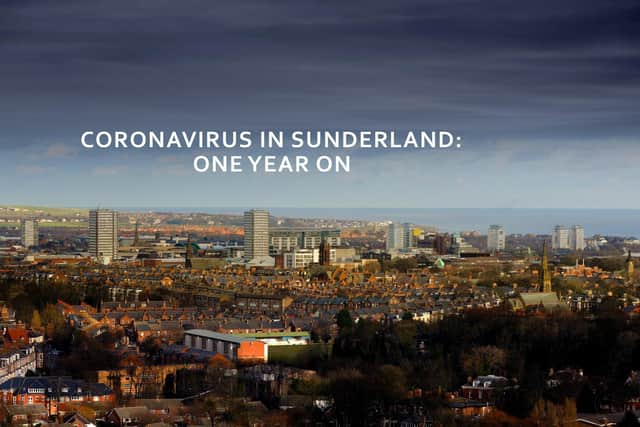

This week, the city’s coronavirus case count topped 21,000. Over the 12 months since she fell ill, the virus has claimed the lives of more than 900 people in Sunderland – including her own beloved brother Joe Jenkins.
Marion’s diagnosis was to prove to be the the start of a year that would transform life in Sunderland and see a whole range of new words and phrases – ‘lockdown,’ ‘social distancing’, ‘stop the spread’ – become part and parcel of ordinary life.
But Sunderland’s first coronavirus scare had actually come a day before Marion was admitted to hospital, when sportswear giant Nike closed its offices in Doxford International amid fears a member of staff may have been infected.
The beginning of the ‘new normal’
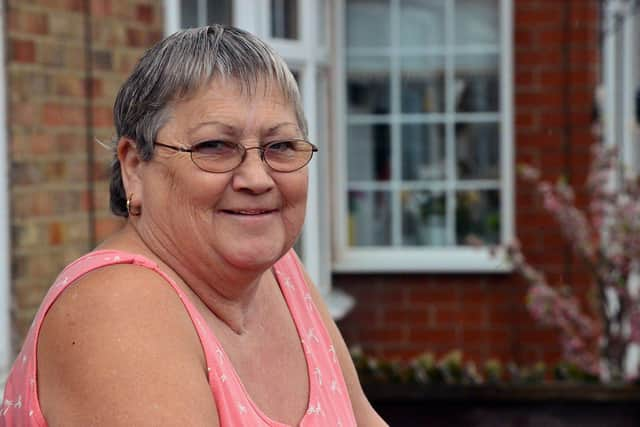

Advertisement
Hide AdAdvertisement
Hide AdAs speculation mounted that a national lockdown – with businesses, shops and schools closing and people forced to work from home – was imminent, panic buying began to set in.
Supermarkets made desperate appeals to people not to clear the shelves.
Toilet paper became so scarce that burglars actually stole rolls during a raid on a Sunderland pensioner’s home.
The reality of the crisis facing the region was driven home on Monday, March 16, when the first North East coronavirus death was confirmed at the University Hospital of North Tees.
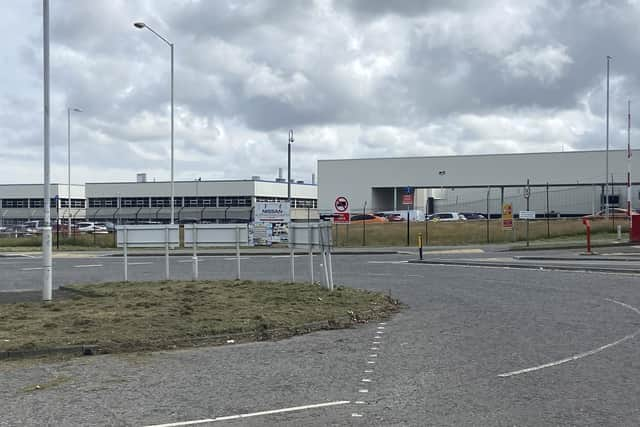

Lockdown one began
Advertisement
Hide AdAdvertisement
Hide AdAs news of the region’s first fatality was confirmed, Prime Minister Boris Johnson said everyone should work from home where possible and avoid unnecessary travel and socialising.
The impact of the pandemic on industry became clear just one day later, when Nissan announced that it was closing its Sunderland plant.
Staff were sent home early on what was initially intended to be a three-day shutdown.
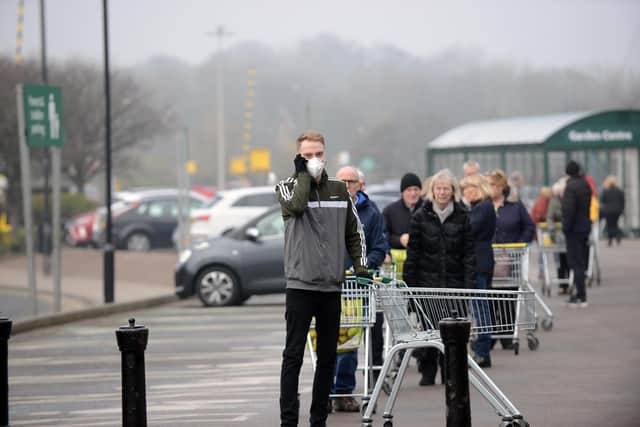

In fact, the plant would not reopen until June and Nissan is still feeling the effects of the crisis, with staff furloughed over parts shortages just this month.
Advertisement
Hide AdAdvertisement
Hide AdMarch 18, 2020, the Government announced all schools would close two days later and on March 20 Chancellor Rishi Sunak unveiled the national furlough scheme.
More than 32,000 people were placed on the scheme in Sunderland initially, and as recently as January 31, there were still almost 15,000 people on furlough in the city.
The national lockdown became reality on March 23, as the Prime Minister used a TV address to tell people to work from home wherever possible and all non-essential shops, gyms, and places of worship were told to close.
Life under first lockdown
As lockdown officially began on March 26, millions nationwide took to their doorsteps to show their support for NHS and care workers in the first Clap for Carers.
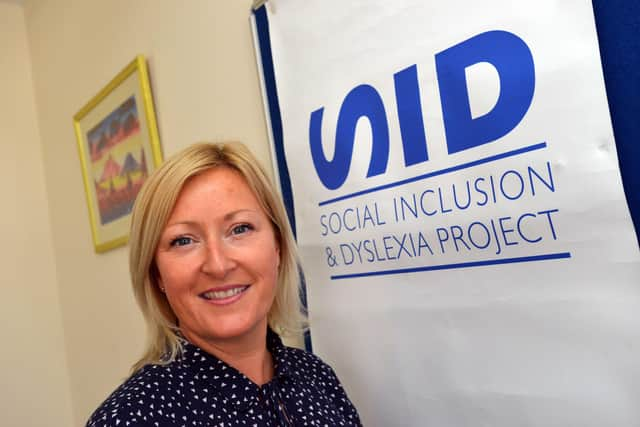

Advertisement
Hide AdAdvertisement
Hide AdAs the show of support continued over the coming weeks, Sunderland would find itself a focus of national attention thanks to the singing nuns of St Anthony’s Convent of Mercy in Ashbrooke.
The rest of us, meanwhile, were getting used to the new rules and queues outside supermarkets were a frequent sight as shoppers patiently awaited their turn.
By the end of the month South Tyneside and Sunderland NHS trust confirmed its first two virus deaths on March 30, followed by another six two days later.
By April 1, barely three weeks after Marion Joliff’s diagnosis had been confirmed, the number of cases in Sunderland had reached 100. By April 10, the death toll was also in three figures.
Advertisement
Hide AdAdvertisement
Hide AdMore than 21,000 people have now tested positive in the city and 900 patients have died at the trust.
By May, preparations for the worst had begun in earnest, and Sunderland’s Nightingale Hospital opened. The massive facility near Nissan would be able to take cases from across the region if mainstream hospitals were unable to cope, it was said, with 460 beds, each capable of taking a ventilator.
City’s passion hit by lockdown
It was not just offices, pubs and restaurants that were affected by lockdown.
On April 7, Sunderland AFC confirmed first team players, academy players and backroom staff had been furloughed after the English Football League announced all games would be cancelled until further notice. The league would later vote to curtail the season entirely.
The current season has been played behind closed doors.
Advertisement
Hide AdAdvertisement
Hide AdJoanne Youngson, of the Sunderland Supporters’ Association Boldon branch, is typical of the thousands of fans who have been unable to watch their heroes in action for the best part of a year.
For Joanne, it is about far more than just the match itself: “You spend days before the match looking forward to it, talking about it, even saving up for it if it is an away game, then you spend the days afterwards talking about it again,” she said.
"I think people who aren’t into football don’t understand. It is such a big, big part of people’s lives.
"Over the years you become friends with people, you become family, because you spend so much time together – and then suddenly you can’t see them.”
The end of the beginning
Advertisement
Hide AdAdvertisement
Hide AdBy the end of May, the first hints of a return to something approaching normality emerged.
The final Clap for Carers was held on May 28 and June 1 saw a staggered reopening of schools.
Three days later, McDonalds reopened its Sunderland drive-thrus, prompting huge queues to form and on June 15 non-essential shops were allowed to reopen.
Businesses may have re-opened, but the economic effects of the pandemic started to be felt and on June 26 MetroCentre and Eldon Square owner Intu entered administration.
Advertisement
Hide AdAdvertisement
Hide AdIt would be far from the last High Street name to fail during the year, with Debenhams, Arcadia group shops including Topshop and Dorothy Perkins closing the doors to their Sunderland branches for good.
Pubs were given the greenlight to reopen from July 4, but many chose not to amid fears of over-crowding.
On July 24, face coverings were made mandatory in shops.
Summer of Eating Out to Help Out and an exam u-turn
Three Wearside venues were forced to close in August after an outbreak.
Ryhope Cricket Club and nearby pubs the Golden Fleece and The Cavalier all closed for deep cleaning after a customer who visited the venues tested positive for Covid.
Advertisement
Hide AdAdvertisement
Hide AdThe Golden Fleece said the man in question had apparently gone for a test after showing symptoms, but ‘decided to have a night out’ while still awaiting the results.
Meanwhile the Eat Out to Help Out scheme was introduced on August 3.
Sunderland diners tucked into almost 400,000 half price meals across 175 venues with the Government paying out more than £2million in the city.
August also saw the Government reverse its stance on exam results nationwide.
Advertisement
Hide AdAdvertisement
Hide AdAfter a row that a computer algorithm used to calculate A-level results had unfairly discriminated against pupils in less well-off areas, the Government confirmed A-level and GCSE results would be based on teacher assessment.
A tale of two football matches
Sunderland kicked off their season behind closed doors on September 5, going out of the EFL Trophy on penalties to Hull City after a scoreless draw.
In the meantime another Wearside football fixture would have serious consequences for the city’s war on Covid.
An outbreak at a charity football match organised by Burnside Working Men’s Club in Houghton led to 300 people having to self-isolate.
Advertisement
Hide AdAdvertisement
Hide AdOver the next week, 28 people who attended an after-game event at the club tested positive for Covid-19.
A statement on the Burnside WMC football team’s Facebook page, signed ‘Tommy’, said: “I will admit the precautions set in place were not strict enough,” it said.
By September 18, at least 61 people who attended the party had tested positive and Sunderland City Council public health specialist Kath Bailey told a meeting of the council’s Health and Wellbeing Board: “Sunderland has seen a rapid increase in COVID-19 cases since the end of August.
“The event at Burnside on August 30 acted as the catalyst for the increase.”
From lockdown to three tier...and back again
Advertisement
Hide AdAdvertisement
Hide AdAs numbers continued to climb across the North East, a new local lockdown was introduced on September 18, covering Tyne and Wear.
Different rules in different areas made it difficult for people to know where they stood.
In early October, Sunderland Bid went so far as to introduce a team of Covid marshalls to help people comply with the rules.
Bid Head of Operations Sharon Appleby said this week that the last year had been ‘incredibly tough’ for everyone, but ‘the resilience and enterprise shown by businesses across Sunderland have seen the city cope much better than many others across the UK’.
Advertisement
Hide AdAdvertisement
Hide AdThe Government announced on October 12 that it was introducing a nationwide three tier system – and Sunderland would be in tier two.
The new rules lasted less than a month and on Halloween, the country’s nightmares came true, with Boris Johnson announcing a second lockdown from November 5 to December 2.
A sad month
November brought another blow to the city, with the sudden death of much-loved local photographer Dean Matthews after testing positive for Covid.
Advertisement
Hide AdAdvertisement
Hide AdPeople were dreaming of an almost-normal Christmas on November 24, when the Government announced households would be able to mix for five days over the festive season but there was bad news just two days later when it was announced that Sunderland and the entire North East would be moved into tier three when the second lockdown ended on December 2.
A not so merry Christmas
By early December, the number of virus-related deaths in the South Tyneside and Sunderland trust had passed the 500 mark but there finally seemed to be light at the end of the tunnel as the new Pfizer vaccine was approved.
The city’s first GP-led vaccine centre opened at the Grindon Lane Primary Care Centre on December 15.However the joy was not to last as the Government announced that it was scrapping the five-day lockdown holiday.
On New Year’s Eve the North East was placed into into tier four of the Coronavirus restrictions.
Advertisement
Hide AdAdvertisement
Hide AdEven that would only last a few days as by January 4 Boris Johnson had bowed to the inevitable and announced a third national lockdown.
A happier New Year?
January saw Sunderland’s vaccination efforts praised by the Prime Minister.
And January 24 saw the city’s Sunderland’s Nightingale Hospital open as a vaccination centre.
Just last month came the news that Sunderland’s uptake of the coronavirus vaccine had topped 60,000.
Advertisement
Hide AdAdvertisement
Hide AdNHS chiefs confirmed all eligible care home patients; over 94% of over 80-year-olds; over 95% of 75 to 79-year-olds; over 85% of 70 to 74-year-olds and 71% of shielding patients with underlying health conditions had received their first jab and the remaining patients had all been offered one.
The road map to normality
The road map to get out of lockdown was unveiled in February, and attention has turned to April when businesses are expected to reopen.
Nicola Collinson and husband Harry run The Looking Glass and Cafe 1851 in the city centre. Nicola said support from Government had helped keep the businesses afloat but the constant uncertainty caused by frequent changes to the rules had been extremely stressful – uncertainty which looks set to continue for the foreseeable future.
"It has not been good but thanks to the support we have had, it could have been worse,” she said.
Advertisement
Hide AdAdvertisement
Hide Ad"But I can’t believe we are going to be back to normal by June or July as some people are saying.
"Even if we are allowed to open, you don’t know what people will be thinking and whether they will want to come out.
Support your Echo and become a subscriber today. Enjoy unlimited access to local news, the latest on SAFC and new puzzles every day. With a digital subscription, you can see fewer ads, enjoy faster load times, and get access to exclusive newsletters and content. Click here to subscribe.